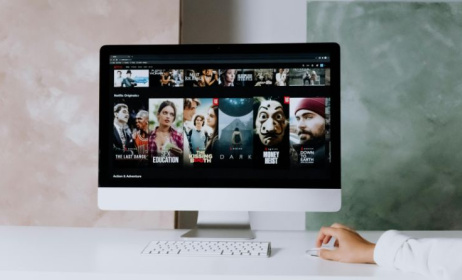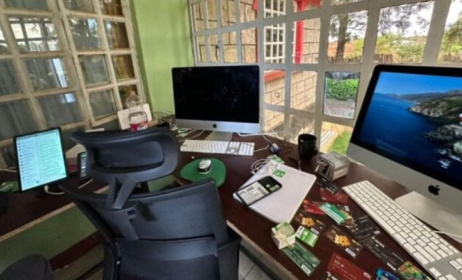Music piracy in The Gambia
By Hassoum Ceesay
Music piracy is defined by as “the copying and distributing of copies of a piece of music for which the composer, recording artist, or copyright-holding record company did not give consent”. As yet there is no empirical study on the scope and nature of music piracy in The Gambia, but anecdotal evidence from careful observations reveals that music piracy indeed exists in the country. This text provides an overview of the subject.
 "The lack of genuine copies made piracy almost unavoidable." Photo: Reuters
"The lack of genuine copies made piracy almost unavoidable." Photo: Reuters
Background
For a long time, The Gambia was one of those countries in West Africa that produced a lot of good popular and traditional music, albeit in the absence of a formal music industry. Since the mid-1960s, the country has produced well-known bands such as the Super Eagles, which produced albums from 1967 to 1971, and Ifangbondi, which was active from 1977 to 1983 and is credited for creating the afro-manding sound, a melange of Senegal’s mbalax beat and Mande kora. Gambian songstress Vicky Blain was popular in Western Europe in the 1960s through to the 1970s. Singing in Wollof, French, English and Krio, her hit ‘Monsieur, monsieur’ cemented her claim to stardom in Europe.
These bands wrote their music in The Gambia, but the total absence of music studios and record labels meant that all the recordings and publishing were done abroad: in the UK with Decca Records for example, or much later in Senegal with Studio 2000.
This meant that piracy of music by local and foreign acts occurred in two ways: firstly, through copying of albums in an industrial scale for home listening and for sale in the music shops like the now closed but famous Jaltron music shop in Banjul and the Kerewan Sounds shop in the main Albert Market in Banjul. A second form of piracy was to record music directly from the radio stations that played the music. Both were rather unsophisticated forms of piracy, one may observe.
To make it even more intriguing, the artists themselves would openly observe that the copying of their albums was necessary, as they were unable to publish anything more than 500 or 1000 copies on the market due to limited finances. Here the lack of genuine copies made piracy almost unavoidable. Fans of popular foreign artists like Bob Marley, Michael Jackson or Tina Turner could only get a genuine copy of their albums by ordering it from abroad at great cost, so most were content to settle for a pirated copy sold in a shop in the Serekunda or Banjul markets. In many ways, music piracy was almost imposed on music fans.
Lack of legislation
Another reason that created a favourable environment for piracy in The Gambia was a gap in the existing laws. Until 2004, the copyright law that existed in the country was the 1911 Copyright Ordinance promulgated by the British, which only protected printed material such as books and government publications. Therefore, regulations against music piracy simply did not exist.
The absence of a copyright law also meant that broadcasters had a field day exploiting music, without the consent of the rights owners or paying royalties. For more than two decades, The Gambia was the only country in sub-Saharan Africa that had both public and private radio - since 1970, when Swedish couple established Radio Syd outside Banjul. It was a 24-hour music station that made free use of music. Its listeners recorded directly from the airwaves, amidst the chatter of the DJs.
The 1981 insurrection against the government of Sir Dawda Jawara caused the death of close to 1000 people and the looting of the leading music store, Jaltron. It also put an end to the once lively music scene because of the long curfew hours and the arrests, death or exile of numerous people who were active in the music scene. Ifangbondi, for example, lost its manager and sponsor to rebel bullets, and several of its member fled to Europe, where the band tried but failed to regain its lost lustre.
For a decade after 1981, there was very little local music produced in The Gambia. This trend only changed in the mid-1990s, when local Kora sensation Jaliba Kuyateh started to churn out albums that regenerated the Gambian music industry. As he sang mainly in Gambian languages, his music soon caught on with Gambians. His cassettes, recorded in Senegal and sold in the Gambia, were copied over and over for sale in shops and supermarkets. In 1999, Badou Jobe, former lead vocalist for Ifangbondi, won the prestigious Kora All Africa Music Award.
The emergence of FM radio stations in the country, which rose from 1 in 1990 to 20 today, increased the scope for the copying of music straight from radio shows.
2004 Copyright Act
In 2004, the government enacted a new Copyright Act that expressly protects music products from illegal use, copying and distribution. The act provides for a Copyright Office under the National Centre for Arts Culture (NCAC) charged with (a) the registration of intellectual property works such as film, books, music products; (b) fighting piracy and: (c) sensitizing the public on copyright issues. The act also provides for the creation of an autonomous body corporate institution, called the Gambia Collecting Society, which will collect royalties for artists whose works are used by radio stations, clubs, taxis, hotels, etc. The body should be set up and run by the artists themselves.
Among other things, the act provides for the creation of copyright inspectors, who have the powers to identify and confiscate suspected pirated music works. Stiff penalties of fines and jail terms are also in place for convicted music pirates. The act provides for a works registration system, in which music publishers and/or producers are required by law to “submit... for registration by the (Copyright Office) not later than one month before its publication... two copies of the best edition”. This registration process is meant to provide proof of ownership of copyright material in cases of piracy-related litigation.
New challenges
Gambians are a net consumer of Senegalese mbalax music because musicians like Youssou Ndour sing mostly in Wolof, which is the lingua franca of urban Gambia. Senegalese music therefore suffers most from piracy. The Senegalese music industry therefore stands to benefit equally if not more when music piracy is snuffed out.
The Gambia, unlike other countries in West Africa, never attempted to have anti-piracy devices such as holograms or banderols. Albums recorded in Senegal carried the Senegalese hologram, but this proved to be a futile exercise as they had no recognition in the Gambia. Currently, The Gambia is preparing to enforce the Economic Community of West African States (ECOWAS) common hologram, which was agreed upon by ECOWAS culture ministers in 2010, and which is expected to be rolled out in 2015.
The digital era of music generation and exploitation poses new challenges in the fight against music piracy in The Gambia. For example, the new generation of recording artists upload most of their music to websites, which opens them to illegal and unauthorised use. In addition, the current copyright law is yet to provide remedies and protection against infringements associated with online music piracy. The numerous online radio stations targeting the large Gambian diaspora use Gambian music, which poses another problem of music piracy. New technology like mobile phones (the Gambia has one of Africa’s highest mobile phone penetration rates) pose both opportunities and challenges to the Gambian music scene. But it obviously increases the possibility of music piracy.
It is obvious from press interviews with Gambian musicians such as Gee, a prominent rapper, that CD sales alone account for a very small percentage of revenue for musicians in the Gambia, mainly because of illegal copying and distribution of music products. However, the existence of the Copyright Act shows political will and is indeed a step in the right direction in the fight against music piracy. Quite a few musicians have started to take a strong stand against the piracy of their albums. As the Gambian music scene evolves gradually into a fully-fledged industry, musicians will become increasingly conscious of their rights and will continue to invoke the law to curb piracy of their works.
Further reading:
- Ceesay, Hassoum. 2009. Gambian Women: An Introductory History. Banjul: Fulladu Publishers.
- Drammeh, Oko. 2013. ‘The Super Eagles: Gambia's Music Super Power’, Daily Observer, 22 March 2013.
- Gambian Government. Copyright Act, 2004.




































Comments
Log in or register to post comments